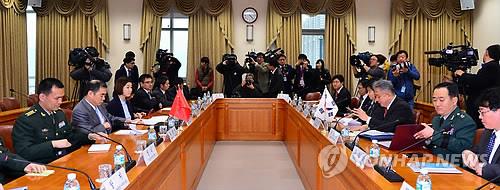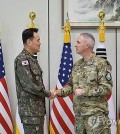- California Assembly OKs highest minimum wage in nation
- S. Korea unveils first graphic cigarette warnings
- US joins with South Korea, Japan in bid to deter North Korea
- LPGA golfer Chun In-gee finally back in action
- S. Korea won’t be top seed in final World Cup qualification round
- US men’s soccer misses 2nd straight Olympics
- US back on track in qualifying with 4-0 win over Guatemala
- High-intensity workout injuries spawn cottage industry
- CDC expands range of Zika mosquitoes into parts of Northeast
- Who knew? ‘The Walking Dead’ is helping families connect
S. Korea, China reaffirm zero tolerance toward N. Korea’s nukes

Officials from South Korea and China hold diplomatic and security talks in Seoul on Jan. 5, 2014. (Yonhap)
SEOUL (Yonhap) — South Korea and China on Monday reaffirmed their stance of zero tolerance toward North Korea’s nuclear weapons program and agreed to beef up their cooperation for regional peace, Seoul’s foreign ministry said.
The officials of the foreign and defense ministries from Seoul and Beijing held working-level talks, a so-called “two plus two” meeting, in Seoul earlier in the day to discuss bilateral and regional security issues including the situation with North Korea, it noted.
During the talks, the two sides agreed to try to make progress on Pyongyang’s nuclear weapons program based on a firm stance of zero tolerance toward it, according to a ranking official from Seoul’s foreign ministry.
“The two sides agreed to further strengthen bilateral and multilateral cooperation for peace and security on the Korean Peninsula,” the official said, asking not to be named.
The six-party talks over North Korea’s denuclearization involving the two Koreas, the United States, China, Japan and Russia have been dormant since December 2008, when the North left the negotiating table.
While Pyongyang is demanding the unconditional resumption of the talks, Seoul and Washington have said the communist country should first show its commitment toward denuclearization. China insists that Seoul and the U.S. should lower the bar for the reopening of the talks.
The Monday meeting, the second of its kind since December 2013, came after North Korea recently offered an olive branch to Seoul by proposing a summit between the political leaders of the two Koreas.
But Pyongyang’s relations with the U.S. have deteriorated, with Washington announcing fresh sanctions on the North last week in response to its alleged cyberattack on Sony Pictures. Some analysts said that Washington’s actions may negatively affect Seoul’s efforts to improve its ties with Pyongyang.
The foreign ministry official said that China “showed its support” to South Korea’s bid to improve the inter-Korean relations, noting that Beijing expects progress on the inter-Korean dialogue.
In what’s seen as an unusual move, Seoul and Beijing did not discuss the recent signing of a military arrangement among Seoul, Washington and Tokyo to share information on North Korea’s nuclear and missile programs, according to the official. China also did not bring up the issue of the possible deployment of an advanced U.S. missile-defense system on South Korean soil.
China largely remains cautious about the three-way pact as it could lead Washington to move closer to Northeast Asia at a time when the U.S. is seen as wary of a rising China.
South Korea and China agreed to launch the working-level security dialogue in June 2013 during summit talks between South Korean President Park Geun-hye and her Chinese counterpart, Xi Jinping.















